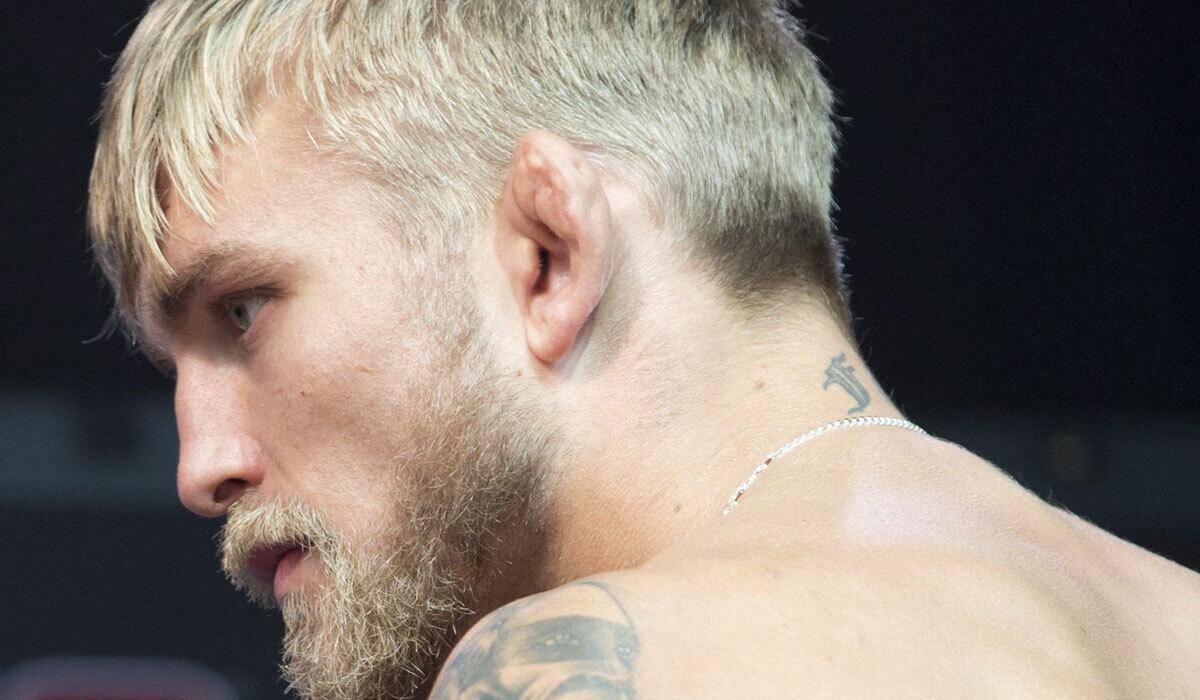Honesty policy could make UFC’s Alexander Gustafsson a champion

Alexander Gustafsson appears at the weigh in for his 2013 bout against Jon Jones.
- Share via
A champion emerges by learning from the sum of his experiences.
Among those that helped shape Ultimate Fighting Championship light-heavyweight title contender Alexander Gustafsson were his losses.
“If it was up to me, I wouldn’t lose at all, but when it happens, that’s when you have to show your real strength,” Gustafsson told The Times in a telephone interview.
The Swede, after losing a closely contested 2013 unanimous decision to then-champion Jon Jones, saw his opportunity at a rematch this year fade when he was upset in his homeland by Anthony Johnson in January.
Johnson knocked down Gustafsson with a stunning short punch in the first round, and had him finished on the canvas less than three minutes into the bout.
“It was a tough experience. I learned I can’t not be at full strength and fight. I have to be better on my defense, I can’t relax in a fight … I wasn’t ready for that fight,” Gustafsson said.
But after a turn of events that included Jones getting stripped of his belt following a hit-and-run accident and Daniel Cormier beating Johnson for the title, Gustafsson’s return fight will come Oct. 3 – a title shot at Cormier in Houston.
“I’m a much better fighter today,” Gustafsson said after training near his Stockholm home rather than in his usual camp in San Diego. “Mentally ready, physically ready.”
A good part of that preparation came following Gustafsson’s humbling internal conversations in which he shed a fighter’s machismo and recognized his weaknesses, assessing where he was vulnerable.
“It is difficult, but you need to be honest with yourself as an athlete, and have a team telling you the right things, being honest with you,” he said.
He was asked if the matchup with a distinguished wrestler like Cormier is a better matchup than those with the universally skilled Jones and the aggressive hammer-punching Johnson.
“I don’t know,” he said. “Every matchup at the top of this division is a tough one, something different. You have to do your homework, be ready and have a fight plan.
“If it goes to wrestling, it’s fine. I’ve done my homework. I’m ready.”
Cormier’s most impressive asset is his experience, Gustafsson said.
“He’s a couple years older, has been doing it longer, he’s a smart guy,” Gustafsson, 28, said of the 36-year-old Cormier. “He’s calm, relaxed, he knows what he’s doing.”
Gustafsson would ideally like to stay standing and strike, relying on his 79-inch reach that is six inches longer than the champion’s.
“My striking for sure” is the best route to victory “but I’m a rounded guy. I’ve got my speed, my precision. I have tools. I’m going to use them,” Gustafsson said.
One of those tools is perspective.
Gustafsson created headlines this week by first telling MMA Junkie that he believes the UFC’s sponsorship deal with Reebok is hurting young fighters who need more financial support than they’re getting from UFC’s tiered pay system.
The Reebok deal no longer allows fighters to wear clothing and emblems of other companies in the octagon.
“I don’t have any complaints myself, I was just giving an honest opinion about what I believe,” Gustafsson said. “Looking back on my own experiences, it’s tough to see … these guys are looking for sponsors with bills to pay. And it’s tough getting into the game.”
More to Read
Go beyond the scoreboard
Get the latest on L.A.'s teams in the daily Sports Report newsletter.
You may occasionally receive promotional content from the Los Angeles Times.








